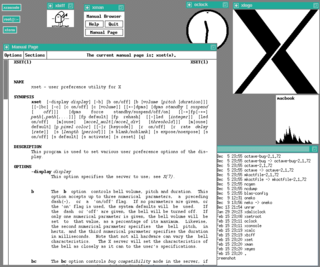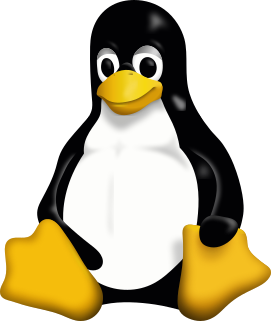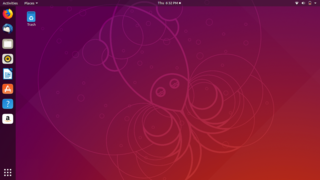
A Linux distribution is an operating system made from a software collection, which is based upon the Linux kernel and, often, a package management system. Linux users usually obtain their operating system by downloading one of the Linux distributions, which are available for a wide variety of systems ranging from embedded devices and personal computers to powerful supercomputers.
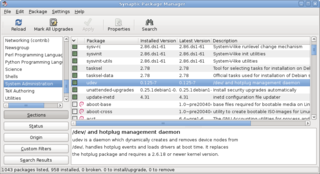
A package manager or package-management system is a collection of software tools that automates the process of installing, upgrading, configuring, and removing computer programs for a computer's operating system in a consistent manner.

Advanced Package Tool, or APT, is a free-software user interface that works with core libraries to handle the installation and removal of software on Debian, Ubuntu, and related Linux distributions. APT simplifies the process of managing software on Unix-like computer systems by automating the retrieval, configuration and installation of software packages, either from precompiled files or by compiling source code.

GoboLinux is an open source operating system whose most prominent feature is a reorganization of the traditional Linux file system. Rather than following the Filesystem Hierarchy Standard like most Unix-like systems, each program in a GoboLinux system has its own subdirectory tree, where all of its files may be found. Thus, a program "Foo" has all of its specific files and libraries in /Programs/Foo, under the corresponding version of this program at hand. For example, the commonly known GCC compiler suite version 8.1.0, would reside under the directory /Programs/GCC/8.1.0.
urpmi is a package management tool for installing, removing, updating and querying software packages of local or remote (networked) media. It wraps around the RPM Package Manager (RPM) package manager so that the user will not suffer the often-encountered dependency hell. It works with official sources from Mandriva or unofficial sources such as those from the Penguin Liberation Front. It has a graphical front-end: Rpmdrake.
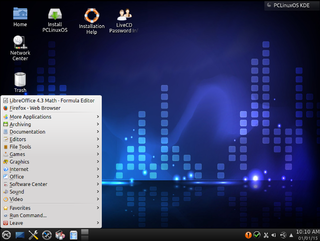
PCLinuxOS, often shortened to PCLOS, is an x86-64 Linux distribution, with KDE Plasma Desktop and MATE as its default user interfaces. It is a primarily free software operating system for personal computers aimed at ease of use. It is considered a rolling release.
Open-source software development is the process by which open-source software, or similar software whose source code is publicly available, is developed by an open-source software project. These are software products available with its source code under an open-source license to study, change, and improve its design. Examples of some popular open-source software products are Mozilla Firefox, Google Chromium, Android, LibreOffice and the VLC media player. Open-source software development has been a large part of the creation of the World Wide Web as we know it, with Tim Berners-Lee contributing his HTML code development as the original platform upon which the internet is now built.
cdrtools is a collection of independent projects of free software/open source computer programs, created by Jörg Schilling and others.
PulseAudio is a network-capable sound server program distributed via the freedesktop.org project. It runs mainly on Linux, various BSD distributions such as FreeBSD and OpenBSD, macOS, as well as Illumos distributions and the Solaris operating system. Microsoft Windows was previously supported via the MinGW toolchain. The Windows port has not been updated since 2011, however.
LinuxMCE is a free and open source software platform with a 10-foot user interface designed to allow a computer to act as a home theater PC (HTPC) for the living-room TV, personal video recorder, and home automation system. It allows control of everything in the home, from lighting and climate to surveillance cameras and home security. It also includes a full-featured VoIP-compatible phone system with support for video conferencing.

rpmdrake is a graphical interface to urpmi, which permits the installation of software packages. It is provided as part of Mandriva Linux, Mageia and ROSA for package installation.

RPM Package Manager (RPM) is a free and open-source package management system. The name RPM refers to the following: the .rpm file format, files in the .rpm file format, software packaged in such files, and the package manager program itself. RPM was intended primarily for Linux distributions; the file format is the baseline package format of the Linux Standard Base.

Linux-libre is an operating system kernel and a GNU package.

Cinnamon is a free and open-source desktop environment for the X Window System that derives from GNOME 3 but follows traditional desktop metaphor conventions. Cinnamon is the principal desktop environment of the Linux Mint distribution and is available as an optional desktop for other Linux distributions and other Unix-like operating systems as well.
dracut is an event-driven initramfs infrastructure. dracut is used to create an initramfs image by copying tools and files from an installed system and combining it with the dracut framework, usually found in /usr/lib/dracut/modules.d.

OpenMandriva Lx is a Linux distribution forked from Mandriva Linux. It is published by the OpenMandriva Association.





